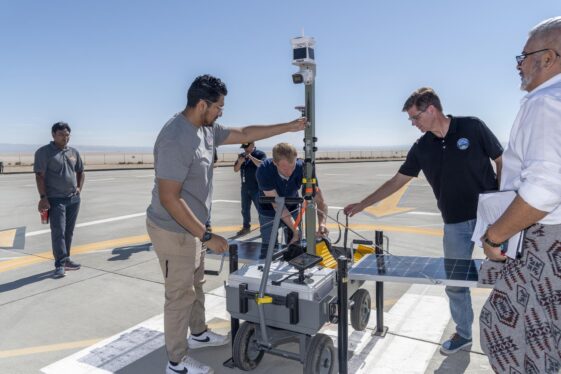3 min read
Preparations for Next Moonwalk Simulations Underway (and Underwater)
Lee esta historia en Español aquí.
Born and raised in Peru, Daniel Velasquez moved to the United States when was 10 years old. While that decision was a big transition for his family, it also created many opportunities for him. Now Velasquez is an operations engineer for NASA’s Air Mobility Pathfinders project at NASA’s Armstrong Flight Research Center in Edwards, California.
Velasquez develops flight test plans for electric vertical take-off and landing (eVTOL) aircraft, specifically testing how they perform during various phases of flight, such as taxi, takeoff, cruise, approach, and landing. He was drawn to NASA Armstrong because of the legacy in advancing flight research and the connection to the Space Shuttle program.
“Being part of a center with such a rich history in supporting space missions and cutting-edge aeronautics was a major motivation for me,” Velasquez said. “One of the biggest highlights of my career has been the opportunity to meet (virtually) and collaborate with an astronaut on a possible future NASA project.”
Velasquez is incredibly proud of his Latino background because of its rich culture, strong sense of community and connection to his parents. “My parents are my biggest inspiration. They sacrificed so much to ensure my siblings and I could succeed, leaving behind the comfort of their home and family in Peru to give us better opportunities,” Velasquez said. “Their hard work and dedication motivate me every day. Everything I do is to honor their sacrifices and show them that their efforts weren’t wasted. I owe all my success to them.”
Velasquez began his career at NASA in 2021 as an intern through the Pathways Internship Program while he was studying aerospace engineering at Rutgers University in New Brunswick, New Jersey. Through that program, he learned about eVTOL modeling software called NASA Design and Analysis of Rotorcraft to create a help guide for other NASA engineers to reference when they worked with the software.
At the same time, he is also a staff sergeant in the U.S Army Reserves and responsible for overseeing the training and development of junior soldiers during monthly assemblies. He plans, creates, and presents classes for soldiers to stay up-to-date and refine their skills while supervising practical exercises, after action reviews, and gathering lessons learned during trainings.
“This job is different than what I do day-to-day at NASA, but it has helped me become a more outspoken individual,” he said. “Being able to converse with a variety of people and be able to do it well is a skill that I acquired and refined while serving my country.”
Velasquez said he never imagined working for NASA as it was something he had only seen in movies and on television, but he is so proud to be working for the agency after all the hard work and sacrifices he made that lead him to this point. “I am incredibly proud to work every day with some of the most motivated and dedicated individuals in the industry.”












